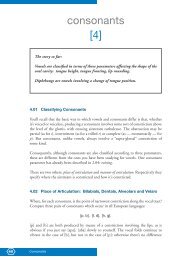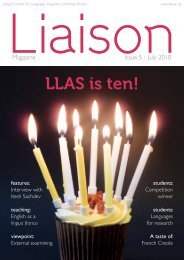PHONETICS MANUAL.indd - HumBox
PHONETICS MANUAL.indd - HumBox
PHONETICS MANUAL.indd - HumBox
Create successful ePaper yourself
Turn your PDF publications into a flip-book with our unique Google optimized e-Paper software.
Voiceless nasals are also a possibility. French has a voiceless [m] in a few words like<br />
rythme, where it follows a voiceless [t]. As there’s little point in devising a special<br />
symbol for such a relatively rare sound, the IPA uses a diacritic (see 3.08) and simply<br />
puts a small circle under the ordinary symbol: [m] 8 or [n]. 8 (A subscript circle always<br />
signifies “voiceless”, whatever consonant it’s placed under.)<br />
Exercises<br />
76. As well as being common in English, [Œ] occurs in French (but only in a rather<br />
special category of words), in Spanish (though in Spanish it’s not separately<br />
represented in the spelling) and in German. Give examples of words with [Œ]<br />
from at least one of these languages.<br />
77. Those very old-fashioned RP speakers who go “huntin’, shootin’ and fishin’”<br />
are accused of “dropping their g’s”. Why is this an odd way of describing<br />
their pronunciation (from a phonetic point of view at least)? How might it be<br />
improved on?<br />
78. The above chart includes a symbol for a labio-dental nasal. This sound actually<br />
occurs in English — though it’s not recognized separately in the spelling. Which<br />
of the following contains a labio-dental nasal, and why? impossible, invalid,<br />
inglorious, indiscrete.<br />
79. How, in rapid speech, is the letter n pronounced in: (a) ten people, (b) unclear,<br />
(c) unveil?<br />
80. Rewrite in ordinary (English) spelling:<br />
[tˆŒ] [l¡ŒIŒ] [k{Œg@ru:] [{Œk@] [tSuŒk] [streŒkT] [{ŒkS@s]<br />
81. Transcribe, using IPA symbols:<br />
language, nightingale, anger, anxiety, hung, anything, dinghy.<br />
4.10 Laterals (the l sounds).<br />
This chapter and the one that follows are particularly important for modern linguists,<br />
since they include many of the most conspicuous consonant differences between<br />
English, French, German and Spanish.<br />
For an l in any language (e.g. the one at the beginning of like), the following conditions<br />
usually have to be met. Check them by saying the [l] of [laik] as you read through<br />
this.<br />
Consonants<br />
57






